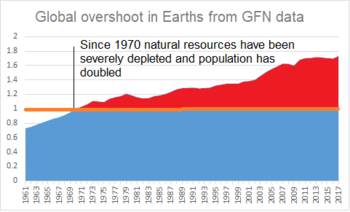
Ecological overshoot is the phenomenon which occurs when the demands made on a natural ecosystem exceed its regenerative capacity. Global ecological overshoot occurs when the demands made by humanity exceed what the biosphere of Earth can provide through its capacity for renewal.[1][2] Scientific use of the term in the context of the global ecological impact of humanity is attributed to a 1980 book by William R. Catton, Jr. titled Overshoot: The Ecological Basis of Revolutionary Change.[3][4][5]
- ^ "Media Backgrounder: Earth Overshoot Day". Earth Overshoot Day. Global Footprint Network. Archived from the original on 25 August 2021. Retrieved 28 August 2021.
- ^ McBain, Bonnie; Lenzen, Manfred; Wackernagel, Mathis; Albrecht, Glenn (2017). "How long can global ecological overshoot last?". Global and Planetary Change. 155: 13–19. Bibcode:2017GPC...155...13M. doi:10.1016/j.gloplacha.2017.06.002. hdl:1959.13/1351443.
- ^ Paul B, Sears (Spring 1981). "REVIEW - Overshoot: The Ecological Basis of Revolutionary Change". Natural Resources Journal. 21 (2): 428–430.
- ^ Dowd, Michael (9 February 2015). "William R. Catton, Jr. (1926—2015)". Huffington Post.
- ^ Dowd, Michael; Barlow, Connie. "Tribute to William R. Catton, Jr". The Great Story. Retrieved 17 December 2024.
